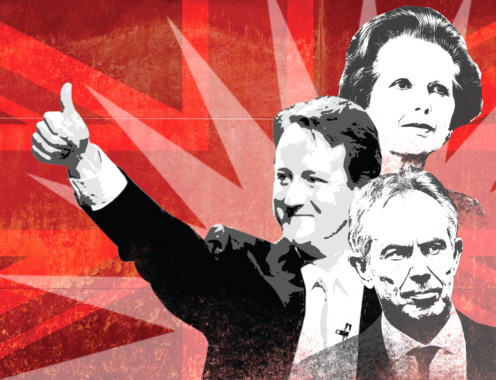
The Tories have always made a virtue out of being retro. “I am very proud of Nanny,” the fogey MP Jacob Rees-Mogg declared to an adoring crowd on Tuesday. But they have truly gone back to the future in Birmingham.
The spin has been that the Conservatives are now the party of “progress, compassion and social justice”. The unmistakable message of the conference, however, is that they are heading backwards on all fronts.
Nothing got delegates more excited during George Osborne’s speech than when the chancellor pledged £3 billion (Dh11.01 billion) more cuts in benefits. They whooped with delight as he promised that the poorest 10 million households would face two years’ further real-terms losses of income.
They thundered their approval when he told them you don’t “set the poor free by giving them money”. Pain has to be inflicted to “eliminate the deficit”, the chancellor insisted, along with another £22 billion worth of “savings”.
The Victorian passion for punishing the poor was never far below the surface in the hall. But David Cameron yesterday revealed that squeezing their living standards had another purpose. The deficit might be “the most important issue that we face”. But there was a still higher calling than fiscal probity: tax cuts for the better-off. The squeeze on child benefit and tax credits for the poorest would, the prime minister made clear, pay for raising the 40 per cent tax threshold on the top 15 per cent of earners — or “middle England”, as the media quaintly likes to call them.
Add to that his plan to raise tax allowances at a cost of well over £7 billion — which benefits the highest earners four times more than the poorest — and cut taxes for wealthy pensioners, and it turns out clearing the deficit isn’t quite as important as we’d been led to believe.
Which is just as well, as the coalition has failed so spectacularly to meet its own deficit targets — even as Cameron and Osborne claim that an economy which still can’t deliver the living standards of 2008 is a great success. The real priority is reducing tax for the better-off and a spectacular lurch back to Thatcherism.
Cameron had, after all, signalled last autumn that austerity wasn’t just about balancing the books but creating a “leaner, more efficient state ... permanently” in the spirit of the 1980s.
Unfulfilled promises
Faced with a string of defections to Ukip, the Tory leadership has swung enthusiastically to the right, helping itself to Nigel Farage’s tax policies, and recycling a slew of unfulfilled promises from round-the-clock GPs’ services to ditching the Human Rights Act.
But it’s not just on the economy, tax and Europe where Cameron’s Conservatives are reaching into the past to bolster support. Theresa May devoted over three quarters of her speech in Birmingham to Muslims and the threat of a catch-all “Islamist extremism”.
Drawing on the tricks of Tony Blair’s invasion-prone government and Thatcher’s failed campaign against the IRA, she promised yet more anti-terror laws: this time to ban non-violent “extremists” from television and protests, and to proscribe groups with no links to terrorism.
The package amounts to a straightforward attack on freedom of speech and democracy — in the name of the “functioning of democracy”. It would alienate Muslims from mainstream politics still further and create a new, all-purpose collection of thought crimes, allowing the authorities to ban views or activities they deem likely to cause “alarm” or “distress”.
The justifications were straight out of the Blair playbook too: from May’s insistence that we are at war with an “ideology” and that “they” hate our values rather than our violent interventions in the Muslim world — to the claim that Daesh could develop weapons of mass destruction to attack us “within a few hours’ flying time of our country”.
The fact that such recycled war propaganda was delivered the day before the clearly politically inspired prosecution of former Guantanamo detainee Moazzam Baig on terrorism charges collapsed, is a reminder of how easily it can be translated into intimidation and Islamphobic prejudice.
But then the third Iraq war, endorsed by parliament on the eve of the Tory conference (the deficit again no object) is itself a lurch backwards into the failures and disasters of the war on terror launched by Bush and Blair 13 years ago.
Like Afghanistan, Iraq and Libya before it, the bombing has been sold as a response to a humanitarian catastrophe and imminent threat but already shows every sign of spreading the terror it is supposed to stop. Mission creep is already upon us, as Cameron softens the public up to join the US campaign in Syria. As in the past, the war is projected to last years, has been launched against our own mutant creation, and is fanning reverse sectarian cleansing on the ground. Revenge terror attacks at home are once again seen as almost certain.
Barack Obama’s models for the latest campaign, Libya and Yemen, are themselves engulfed in conflict. The US administration has even been caught out concocting a dodgy dossier-style cover story, the “Khorasan group”, for attacking non-Isis targets in Syria. As if to add to the sense of Groundhog Day, the US has just signed a deal with Afghanistan’s new president to keep American forces in the country for another 10 years, while the Tory defence secretary Michael Fallon has refused to rule out a British return to Afghanistan.
It may not offer a Falklands factor for the election, but Cameron is already wrapping himself in the union jack to pick up whatever war leader’s dividend might be available before the price of intervention becomes clear. Fortunately support for the bombing is fragile, both inside and outside parliament. Even Rees-Mogg expressed misgivings this week and declared he had been wrong to vote for the Libya imbroglio. One way or another, we need to escape the past — at home and abroad.
— Guardian News & Media Ltd










